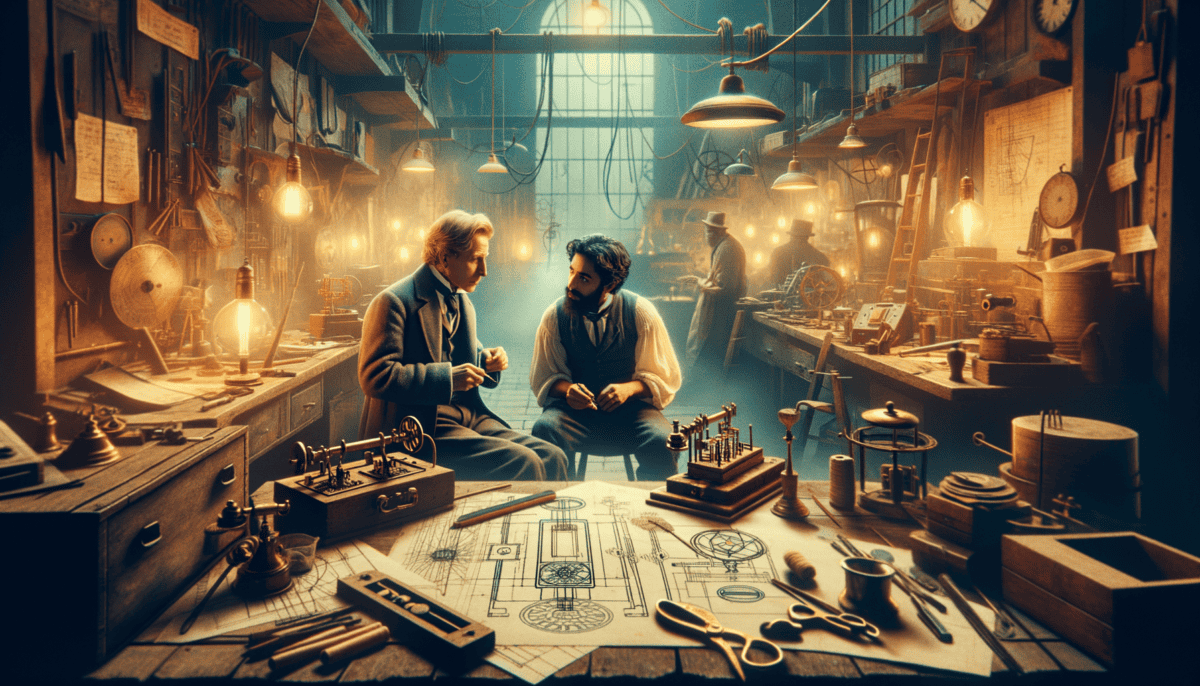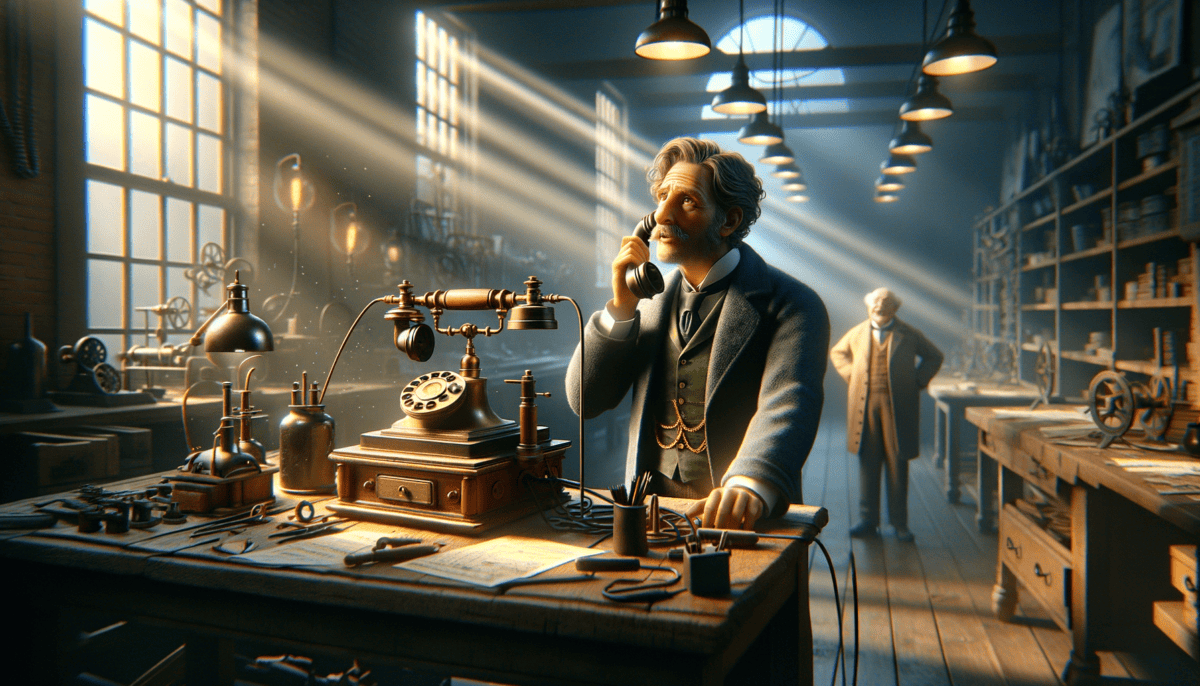The Curious Mind
Little Aleck Bell sat at his mother's feet, watching her face light up as she played the piano. Her fingers danced across the keys, but she couldn't hear the beautiful music she made. You see, Aleck's mother was deaf, but that didn't stop her from filling their Edinburgh home with melody.
"Mother, I wish you could hear how wonderful it sounds," young Aleck said, gently touching her hand.
His mother smiled warmly. "I feel the music through my fingers, dear. Sometimes we don't need ears to understand the world around us."
This moment would stay with Aleck forever. Even at age ten, he knew he wanted to help people like his mother communicate better with the world.
Born in Scotland in 1847, Aleck was different from other children. While they played with toys, he played with sounds. His father taught people how to speak clearly, and young Aleck loved watching him work.
One day, Aleck made an amazing discovery in his family's garden. He found that by speaking into a small space, he could make his voice sound different. This got him thinking – what if he could find new ways to help people talk to each other?
"Father!" he exclaimed, running into the house. "I've been thinking about how sound travels!"
His father looked up from his work with a smile. "Tell me more, son."
Here are some of the things that made young Aleck special:
- He loved to learn about sounds and voices
- He cared deeply about helping deaf people
- He asked lots of questions about everything
- He never gave up when things got hard
- He liked to invent new things
As Aleck grew older, he started making his own inventions. His first creation was a simple machine that could help his friend's father mill wheat more easily. The farmer was so impressed that he gave Aleck a small workshop to continue his experiments.
"Aleck," his mother wrote in a note one evening, "your mind is like a butterfly – always moving, always curious. Never lose that wonder."
Those words encouraged him to keep exploring. He spent hours in his workshop, trying to understand how sounds worked. Sometimes his experiments failed, but that just made him try harder.
One evening, as the sun set over Edinburgh, Aleck made an important decision. He would dedicate his life to helping people communicate. He didn't know it yet, but this choice would lead him to invent something that would change the world forever.
"Mother," he signed to her before bed, "someday I'll find a way to help everyone talk to each other, no matter how far apart they are."
His mother hugged him tight, proud of her son's big dreams. Neither of them knew that young Aleck would grow up to be Alexander Graham Bell, the man who would invent the telephone and connect people across the world in ways they never imagined possible.
As stars twinkled outside his window that night, Aleck's mind buzzed with ideas. He had no way of knowing that his curiosity about sound would someday help millions of people talk to each other across great distances. But that's exactly what happened, and it all started with a little boy who wanted to help his mother hear the world around her.
The Dream Takes Shape
Boston, 1871. Alexander Graham Bell stood before his class at the School for the Deaf, his heart full of purpose. His students watched carefully as he showed them how to form sounds with their mouths.
“Feel the vibration in your throat,” he demonstrated, placing a student’s hand gently near his voice box. Young Sarah’s eyes lit up as she understood.
But teaching wasn’t enough for Bell. Every evening, after his students went home, he worked on something special. He dreamed of making a machine that could send voices through wires, just like telegraphs sent dots and dashes.
“What if,” he wondered aloud one night, “we could make electricity carry the sound of a voice?”
That’s when Thomas Watson walked into his life. Watson was good at building things, and he believed in Bell’s dream. Together, they made a perfect team:
- Bell had the big ideas about sound
- Watson knew how to build the machines
- They worked late into the night
- They never gave up when things went wrong
- They encouraged each other to keep trying
“Mr. Bell,” Watson said one day, wiping grease from his hands, “I think we’re getting closer. Listen to this!” Their latest machine made a small squeaking sound.
Their workshop was a magical place. It was full of wires, springs, and all sorts of strange-looking devices. Some looked like cups with strings, others like musical instruments with electrical parts.
“What happens if we try this?” Bell would ask, sketching new ideas in his notebook. Watson would then build them, making Bell’s drawings come to life.
Sometimes their experiments made funny noises. Other times, nothing happened at all. But Bell and Watson kept trying. They knew they were working on something that could change how people talked to each other forever.
“Imagine,” Bell told Watson one evening, “a mother in Boston talking to her child in New York, hearing their voice as clear as if they were in the same room.”
Watson smiled. “That would be something amazing, Mr. Bell. And we’re going to make it happen.”
Their work wasn’t easy. Sometimes the machines broke. Sometimes people laughed at their ideas. But Bell remembered his mother’s courage and kept going. He knew that great dreams take time to come true.
As winter turned to spring, Bell and Watson got closer to their goal. Their machine was starting to make clearer sounds. The dream of sending voices through wires was becoming more real every day.
Little did they know, they were about to make history. The telephone was almost ready to share its first words with the world.
The Race Against Time
The winter of 1876 brought a chill to Boston that seemed to seep right through the walls of Bell’s workshop. But inside, the air crackled with excitement – and worry.
“Mr. Bell!” Watson burst through the door one morning, waving a newspaper. “Elisha Gray is working on something similar. We must hurry!”
Bell’s hands trembled as he read the article. Elisha Gray, another smart inventor, was also trying to make a telephone. It was like a race, and Bell needed to finish first!
“We’ll work harder,” Bell said, rolling up his sleeves. “We’re so close, Watson. I can feel it!”
Their workshop became busier than ever. Here’s what they did each day:
- Morning: Test new ideas
- Afternoon: Fix broken parts
- Evening: Write down results
- Night: Plan tomorrow’s work
- Repeat!
Money was running out. Bell had to choose between buying food and buying parts for his invention. Sometimes he picked parts over dinner.
“What if we never make it work?” Watson worried one day.
Then came an exciting breakthrough! One day, their machine made a sound that almost sounded like a word. Watson jumped up and down!
But they couldn’t celebrate long. News arrived that Elisha Gray was getting ready to submit his own patent. They had to work faster! ♂️
“We need to write down everything about our telephone,” Bell said. “Every tiny piece, every little wire.”
Bell stayed up all night drawing pictures of his invention. His hands got covered in ink. His eyes were tired. But he kept working.
The next morning, Bell grabbed his papers and rushed through the snowy streets. The patent office would open soon. His feet slipped on the icy sidewalk, but he didn’t slow down.
“Just… a… little… further,” he panted, clutching his precious drawings.
The clock was ticking. Other inventors were coming. But Bell had something they didn’t – he had Watson, he had determination, and most importantly, he had a dream that was about to change the world.
The Historic Moment
March 10, 1876 dawned bright and clear in Boston. Alexander Graham Bell’s hands shook with excitement as he set up his latest experiment.
“Everything must be perfect,” Bell whispered, checking each wire carefully. Watson waited in the next room, ready to help.
The machine looked simple – just some wires, a few metal pieces, and what looked like a cup to talk into. But this simple machine would change everything!
“Watson!” Bell called out. “Are you ready?”
“Ready, Mr. Bell!” Watson shouted back from down the hall.
Bell leaned close to the speaking tube. His heart was beating fast. He had tried this so many times before, but today felt different. Something special was in the air.
“Mr. Watson, come here! I want to see you!”
For a moment, everything was quiet. Then…
Watson came running into the room, his eyes wide with wonder! “Mr. Bell! Mr. Bell! I heard your voice through the wire! Every word!”
The two men jumped up and down, hugging each other and laughing. They had done it! The telephone worked!
Soon, they started showing their invention to other people. Here’s what happened when people first saw the telephone:
- Some people thought it was magic
- Others said it would never work
- Many were scared to try it
- A few called it a toy
- Smart people saw how special it was
Bell and Watson took their telephone to big shows. They let people try it themselves. One old scientist tried it and smiled like a little kid. “Amazing!” he said. “Simply amazing!” ⭐
“Hello? Can you hear me?” became the most exciting words people could say. Each time someone heard a voice through the wire, their faces lit up with joy.
Newspapers wrote about the telephone. Scientists came to see it. Even people who didn’t believe in it at first had to admit – this was something special.
Bell stayed up late many nights, writing in his diary about his success. He drew pictures of happy faces connected by telephone wires. His dream was coming true!
That night, after everyone went home, Bell sat alone with his telephone. He picked it up and whispered, “Hello, world. Are you ready for something wonderful?”
From Invention to Innovation
The warm summer sun shone through Bell’s new office window. A shiny sign outside read “Bell Telephone Company.” Just one year after the first “Hello,” big things were happening!
“Mr. Bell, we have another order from New York!” Watson rushed in, waving a paper. “And one from Chicago too!”
Bell smiled at his friend. “Remember when people said the telephone wouldn’t work? Now they can’t wait to get one!”
The first telephone lines went up between cities. Workers climbed tall poles to hang wires that would carry voices far and wide.
- Stores got telephones to take orders
- Doctors could talk to sick people from far away
- Families could chat even when apart
- People could call for help in emergencies
- Business grew faster than ever before
“Hello, operator? Please connect me!” became words heard in homes across America. Special workers called “operators” helped connect calls by plugging wires into the right spots.
One day, a little girl called her grandmother for the first time. “Grandma! It’s really you! I can hear you!” she squealed with joy. Bell, watching nearby, wiped away happy tears.
The telephone company grew bigger and bigger. More cities wanted phone lines. More people wanted phones in their homes. Bell and Watson worked hard to make better phones that could send voices even further.
But not everything was easy. Sometimes the wires broke in storms. Sometimes people talked too softly to hear. Sometimes the connections weren’t clear. But Bell and his team fixed each problem, one by one. ️
Soon, special telephone buildings called “exchanges” appeared in every big city. Inside, operators worked day and night to connect calls. The sound of voices traveled through miles of wire, connecting friends and families everywhere.
Bell kept working to make phones better. He tested new ideas. He fixed problems. He dreamed of a day when anyone could call anyone else, anywhere in the world!
One evening, as the sun set, Bell picked up a telephone and smiled. The little machine that started with “Mr. Watson, come here” was now connecting people across the whole country. And this was just the beginning! ⭐
Legacy of Connection
On a crisp autumn morning in 1922, an elderly Alexander Graham Bell sat in his garden, holding a modern telephone. His white beard caught the sunlight as he smiled, remembering how far they’d come.
“Can you imagine, Watson?” Bell said to his old friend, who sat nearby. “From that first call in our workshop to telephones in homes across the world!”
Watson chuckled. “And to think people once said it would never work!”
- Families stayed close even when far apart
- People could get help faster in emergencies
- Business grew bigger than ever before
- Friends could talk across oceans
- ❤️ Love and care could travel through wires
Bell watched children playing with toy telephones in the street. “Look at them,” he said softly. “They’ve never known a world without phones. It’s as natural to them as breathing.”
Bell kept working on new ideas his whole life. He made flying machines, boats that went fast on water, and ways to help people hear better. But the telephone remained his most special creation.
“Do you know what makes me happiest?” Bell asked Watson. “It’s not the money or fame. It’s knowing that somewhere, right now, a child is talking to their grandparent, a doctor is helping someone sick, or friends are sharing good news – all because of our telephone.”
As evening approached, Bell picked up his modern telephone one last time. The small black device felt so different from that first wooden telephone, but its magic remained the same. “Hello,” he spoke softly, his voice carrying through wires that now stretched across continents.
Today, we carry phones in our pockets that can do much more than Bell ever dreamed possible. We can see each other’s faces while we talk, send messages instantly, and connect with people anywhere in the world.
But it all started with one man’s dream to help people hear each other better. Alexander Graham Bell showed us that with love, hard work, and belief in yourself, one person’s idea can change the world forever. ⭐
The next time you say “Hello” on your phone, remember Bell’s amazing story. Remember how he never gave up, how he kept trying even when things were hard, and how his invention brought people closer together in ways that still touch our lives today.






